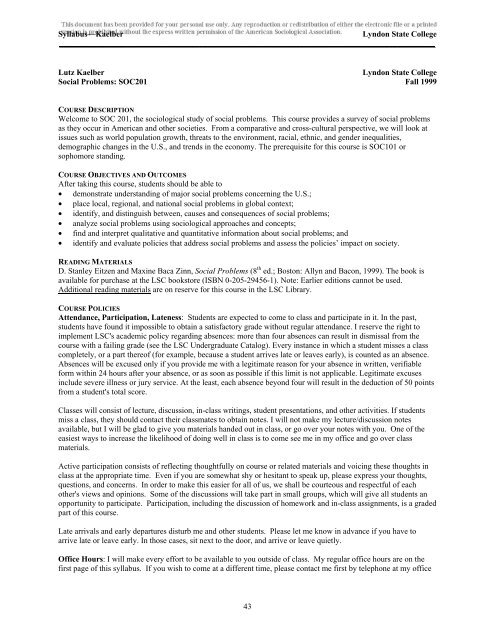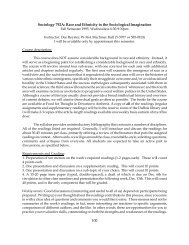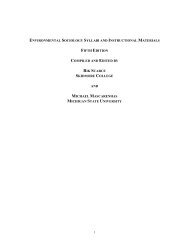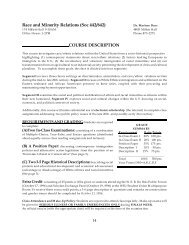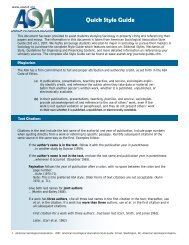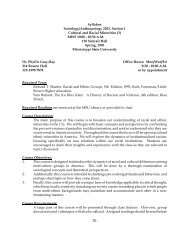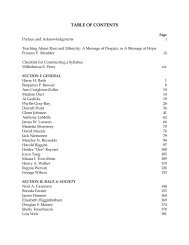Social Problems - American Sociological Association
Social Problems - American Sociological Association
Social Problems - American Sociological Association
You also want an ePaper? Increase the reach of your titles
YUMPU automatically turns print PDFs into web optimized ePapers that Google loves.
Syllabus—Kaelber Lyndon State College<br />
_____________________________________________________________________________________________<br />
Lutz Kaelber Lyndon State College<br />
<strong>Social</strong> <strong>Problems</strong>: SOC201 Fall 1999<br />
COURSE DESCRIPTION<br />
Welcome to SOC 201, the sociological study of social problems. This course provides a survey of social problems<br />
as they occur in <strong>American</strong> and other societies. From a comparative and cross-cultural perspective, we will look at<br />
issues such as world population growth, threats to the environment, racial, ethnic, and gender inequalities,<br />
demographic changes in the U.S., and trends in the economy. The prerequisite for this course is SOC101 or<br />
sophomore standing.<br />
COURSE OBJECTIVES AND OUTCOMES<br />
After taking this course, students should be able to<br />
• demonstrate understanding of major social problems concerning the U.S.;<br />
• place local, regional, and national social problems in global context;<br />
• identify, and distinguish between, causes and consequences of social problems;<br />
• analyze social problems using sociological approaches and concepts;<br />
• find and interpret qualitative and quantitative information about social problems; and<br />
• identify and evaluate policies that address social problems and assess the policies’ impact on society.<br />
READING MATERIALS<br />
D. Stanley Eitzen and Maxine Baca Zinn, <strong>Social</strong> <strong>Problems</strong> (8 th ed.; Boston: Allyn and Bacon, 1999). The book is<br />
available for purchase at the LSC bookstore (ISBN 0-205-29456-1). Note: Earlier editions cannot be used.<br />
Additional reading materials are on reserve for this course in the LSC Library.<br />
COURSE POLICIES<br />
Attendance, Participation, Lateness: Students are expected to come to class and participate in it. In the past,<br />
students have found it impossible to obtain a satisfactory grade without regular attendance. I reserve the right to<br />
implement LSC's academic policy regarding absences: more than four absences can result in dismissal from the<br />
course with a failing grade (see the LSC Undergraduate Catalog). Every instance in which a student misses a class<br />
completely, or a part thereof (for example, because a student arrives late or leaves early), is counted as an absence.<br />
Absences will be excused only if you provide me with a legitimate reason for your absence in written, verifiable<br />
form within 24 hours after your absence, or as soon as possible if this limit is not applicable. Legitimate excuses<br />
include severe illness or jury service. At the least, each absence beyond four will result in the deduction of 50 points<br />
from a student's total score.<br />
Classes will consist of lecture, discussion, in-class writings, student presentations, and other activities. If students<br />
miss a class, they should contact their classmates to obtain notes. I will not make my lecture/discussion notes<br />
available, but I will be glad to give you materials handed out in class, or go over your notes with you. One of the<br />
easiest ways to increase the likelihood of doing well in class is to come see me in my office and go over class<br />
materials.<br />
Active participation consists of reflecting thoughtfully on course or related materials and voicing these thoughts in<br />
class at the appropriate time. Even if you are somewhat shy or hesitant to speak up, please express your thoughts,<br />
questions, and concerns. In order to make this easier for all of us, we shall be courteous and respectful of each<br />
other's views and opinions. Some of the discussions will take part in small groups, which will give all students an<br />
opportunity to participate. Participation, including the discussion of homework and in-class assignments, is a graded<br />
part of this course.<br />
Late arrivals and early departures disturb me and other students. Please let me know in advance if you have to<br />
arrive late or leave early. In those cases, sit next to the door, and arrive or leave quietly.<br />
Office Hours: I will make every effort to be available to you outside of class. My regular office hours are on the<br />
first page of this syllabus. If you wish to come at a different time, please contact me first by telephone at my office<br />
43


